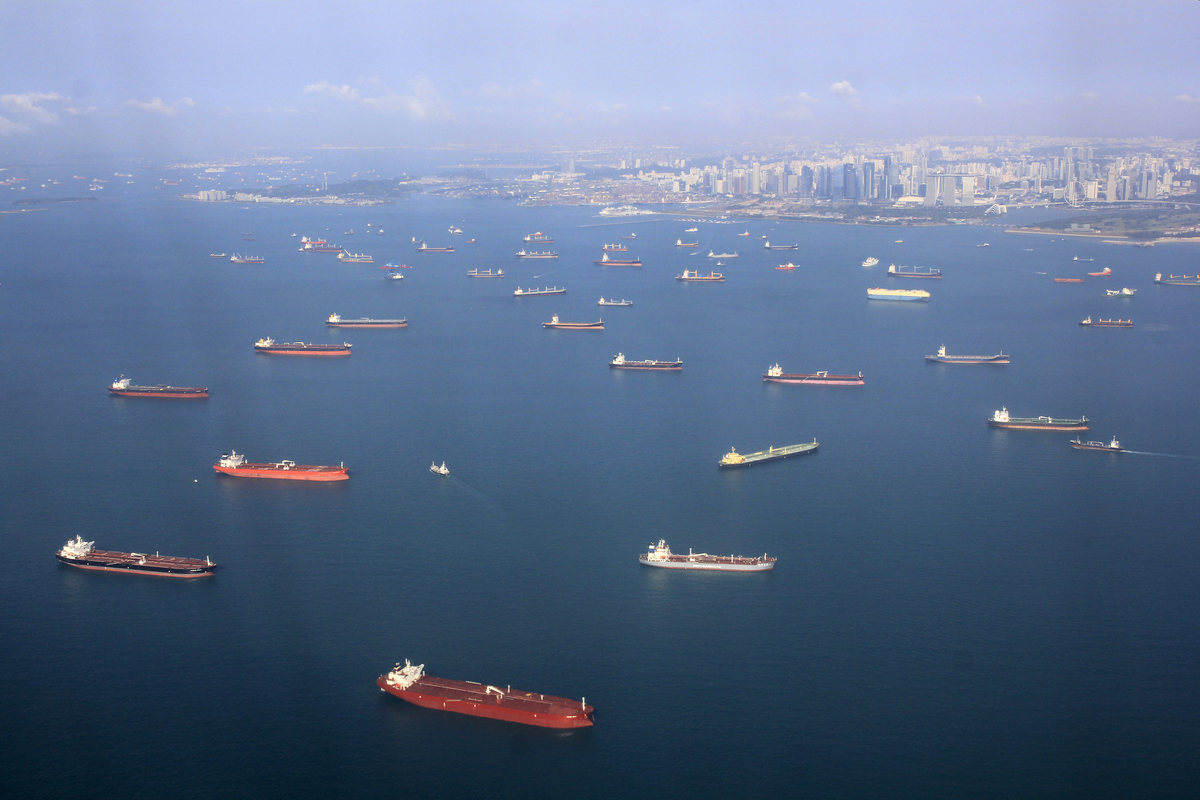GMF report finds massive yearly increase in green shipping projects
There has been a 84% rise in shipping decarbonisation pilot projects around the world in the past year, a new report from the Global Maritime Forum (GMF) has revealed.
 PHOTO: Dense rows of vessels on the waters of Singapore. Getty Images
PHOTO: Dense rows of vessels on the waters of Singapore. Getty Images
A total of 170 new projects were registered in the report this year, taking the count to 373. These projects span ship technology, fuel production, infrastructure and bunkering.
The report found that more than a third of these projects have advanced to the next stage or reached a significant milestone in the past year. This included 30 Approvals in Principle (AiP) for ship technology projects between 2022 and 2023 – significantly up from seven in 2021.
The report has identified a “highly collaborative approach to decarbonising shipping,” with 87% of the projects involving two parts of value chain, and 70% engaging at least two countries as project partners.
The most active value chain segments have been shipbuilding, equipment and technology (23%), energy production (16%), shipowning and operations (16%), ship classification (9%) and port and terminal operations (7%).
Norway, Germany, the UK, US and Japan have come out as the top five countries with most representations in these projects.
Shipping decarbonisation projects continue to spread globally, with new countries such as Thailand, Egypt, Malaysia and South Africa getting involved. But some regions have been more active than others. Europe (56%), Asia (33%) and North America (9%) have been the most prominent.
Projects focused on establishing supply and demand for ammonia and hydrogen as future fuels have gained prominence over the year. Ammonia has been the most preferred future fuel with zero-emission potential for larger ship types, with most AIPs being granted to ammonia-powered and ammonia-ready vessel designs last year.
Battery technology, hydrogen fuel cells, hydrogen internal combustion engines and methanol have been more attractive options for smaller ships. Notably, methanol and batteries were the third and fourth biggest points of focus, the report found.
Ammonia
Some of the recent developments in the ammonia space include Norway-based Grieg Maritime and Neapolitan shipping company Grimaldi Group ordering ammonia-ready vessels to add to their fleet.
Technology company Pherousa Green Technologies (PGT) recently unveiled plans to debut its onboard ammonia-to-hydrogen cracking system on ammonia-fuelled dry bulk carriers. At the G7 summit last month, Japanese shipping company NYK Line disclosed its plans to build ammonia-fuelled vessels. Japanese shipbuilder Mitsubishi Shipbuilding said it has delivered an ammonia fuel supply system to engine manufacturer J-ENG.
Hydrogen
On the hydrogen front, India and Australia have partnered to create a green hydrogen task force. US-based footwear giant Nike also recently said that it will use a green hydrogen-powered inland container barge to transport its products in Europe.
Methanol
The GMF report found that most methanol-based projects have now moved from pilot phases to commercialisation. The Maritime and Port Authority of Singapore’s (MPA) chief executive Eng Dih Teo said in April that the port will be in a position to facilitate methanol bunkering from the third quarter of 2023. In Europe, the Port of Rotterdam is confident it will see regular methanol bunkering of ocean-going vessels from this summer onwards. And Danish multinational wind energy giant Ørsted has started constructing its 50,000 mt/year e-methanol plant in Örnsköldsvik in northern Sweden, which it says will cater to a “growing fleet of methanol-powered vessels.”
Bunker-related carbon-cutting projects have also gained a lot more prominence in the past year, making up 19% of all bunker-related projects. Among these new projects, which are located across Europe, Asia and North America, seven are focused on ammonia and four on methanol, the report found.
“It is promising that the number of zero-emission pilot and demonstration projects is increasing each year and impactful projects are being developed in the Global South,” GMF’s chief executive Johannah Christensen commented.
The fourth edition of the report, titled Mapping of Zero-Emission Pilots and Demonstration Projects, was presented at the Getting to Zero Coalition Workshop in Paris. The workshop was hosted by GMF in partnership with classification society Bureau Veritas and French maritime organisation French Maritime Cluster.
By Tuhin Roy
Please get in touch with comments or additional info to news@engine.online






